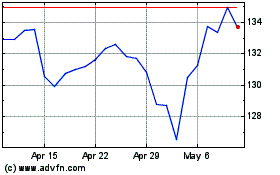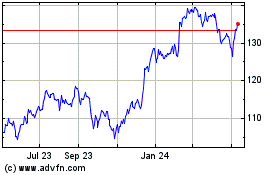NYSE Owner Abandons Potential eBay Deal -- 2nd Update
February 06 2020 - 7:11PM
Dow Jones News
By Alexander Osipovich
The parent company of the New York Stock Exchange abandoned its
pursuit of eBay Inc. in a dramatic reversal just days after its
interest in a deal became public, triggering a backlash from
investors.
Intercontinental Exchange Inc., or ICE as it is also known, said
in a statement released after markets closed Thursday that it was
giving up on its consideration of "strategic opportunities" with
eBay based on conversations with investors after its morning
earnings call.
The move followed a sharp decline in ICE shares after The Wall
Street Journal reported Tuesday that the company had made an
overture to eBay that could result in a takeover worth more than
$30 billion. ICE shares dropped 7.5% that day and almost another 3%
Thursday as investors voted against the idea by selling their
shares. The drop in the exchange operator's stock has wiped out
more than $5 billion in market value.
The shares rallied roughly 3% in Thursday's after-hours trading
following the company's statement.
The reversal is an embarrassing setback for ICE Chief Executive
Jeffrey Sprecher, who built a global exchange empire by making
audacious acquisitions such as the $8.2 billion takeover of the
NYSE's parent company in 2013. Though not a household name,
Atlanta-based ICE is a key player in the global financial markets,
running platforms that process trillions of dollars worth of
securities and derivatives trades each year.
Its shareholders have been rewarded handsomely over the years as
Mr. Sprecher built the company. ICE stock has appreciated 1,048%
since it went public in 2005, after accounting for stock splits,
and its market value is currently about $50 billion.
But news of its interest in eBay -- an e-commerce platform on
which vendors hawk everything from lawn mowers to Baby Yoda dolls
-- took ICE investors by surprise and proved to be a bridge too far
for them. ICE didn't anticipate how strongly some analysts and
shareholders had felt about eBay.
Acquiring eBay would have put ICE far outside its traditional
comfort zone of running markets for stocks, futures and other
derivatives and selling financial data to Wall Street. Analysts
questioned the strategic rationale as well as the hefty price
tag.
EBay's shares gained 2.4% Thursday on Mr. Sprecher's remarks on
the earnings call. Since Monday's close, eBay's stock was up more
than 10% on the possibility of a takeover, its market value topping
$30 billion. The shares shed some 6% after hours following ICE's
statement.
ICE has approached eBay more than once about a deal, including
most recently within the past couple of months, according to people
familiar with the matter. It indicated to the e-commerce company
that it would have financial partners for a deal, the people said.
ICE was mainly interested in eBay's core marketplace business and
not its classified-advertising unit, which has been a candidate for
possible divestiture.
Its interest became public just two days before ICE was to
report its fourth-quarter results. On Thursday morning, ICE
reported net revenue of $1.3 billion and earnings of 95 cents a
share, in line with analysts' expectations.
Speaking to analysts on a call scheduled to discuss the results,
Mr. Sprecher said no deal was imminent and that eBay had rebuffed
ICE's overtures, reiterating a statement ICE released earlier in
the week.
But departing from executives' typical aversion to talking about
private deal deliberations in public, he discussed at length why
ICE was interested in San Jose, Calif.-based eBay, outlining what
could be seen as a rationale for a transaction.
"We both match buyers and sellers," Mr. Sprecher said on the
call. "We both collect and organize data. We both work with third
parties to provide physical distribution. We both provide useful
analytics to enhance the transaction experience."
He tried to impress upon analysts that ICE's approach to eBay
was thoughtful and made strategic sense. "We didn't lose our minds
over the weekend," he said.
He reminded analysts that many investors had been dubious when
ICE agreed to buy the NYSE's parent company.
At the time, the Big Board's share of U.S. stock trading had
collapsed after regulators opened it to greater competition. Many
observers saw it as an institution in decline. But ICE rejuvenated
the 200-year-old exchange, slashing jobs, eliminating
underperforming businesses and revamping outdated technology.
ICE had considered eBay a fixer-upper not unlike the NYSE. In
the 1990s, eBay was among the pioneers of online commerce, but in
recent years has fallen behind such rivals as Amazon.com Inc.
Before news of a potential tie-up, shares of eBay had fallen 22%
from their peak in 2018. Under pressure from activist investors,
the company announced a strategic review and moved to sell assets
including its ticketing business, StubHub.
Some see eBay as a company caught in a vise, pressured on one
side by Amazon and its colossal scale and on the other by niche
e-commerce startups with devoted followings such as the
used-luxury-goods marketplace TheRealReal Inc. and the sneaker
exchange StockX.
Write to Alexander Osipovich at
alexander.osipovich@dowjones.com
(END) Dow Jones Newswires
February 06, 2020 18:56 ET (23:56 GMT)
Copyright (c) 2020 Dow Jones & Company, Inc.
Intercontinental Exchange (NYSE:ICE)
Historical Stock Chart
From Mar 2024 to Apr 2024

Intercontinental Exchange (NYSE:ICE)
Historical Stock Chart
From Apr 2023 to Apr 2024
